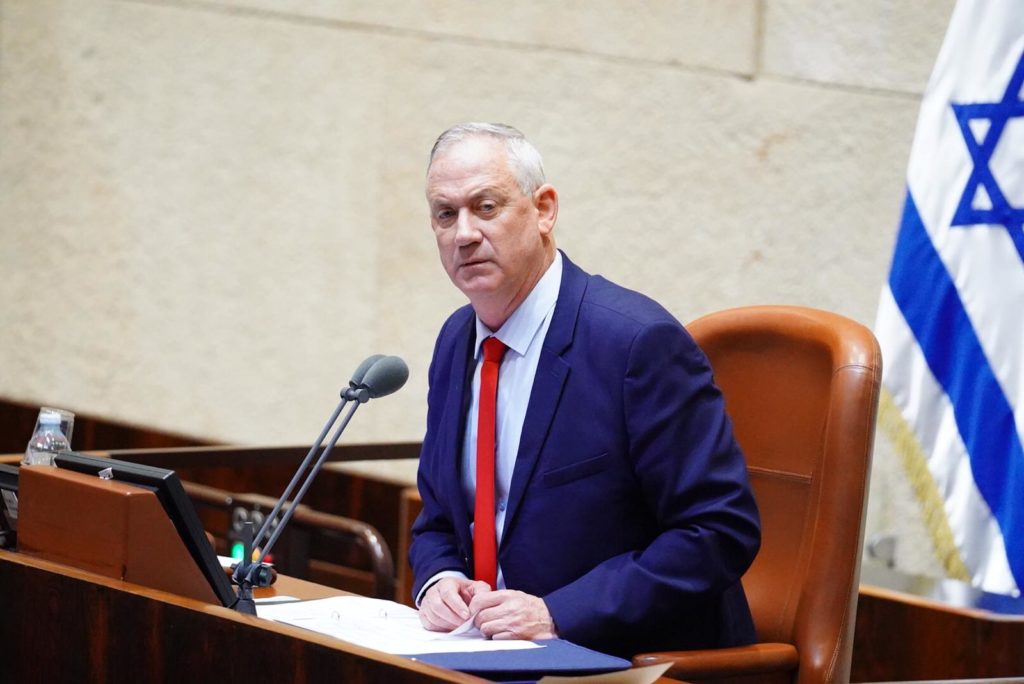Australia/Israel Review, Featured
Politics in times of pandemic
Mar 27, 2020 | Amotz Asa-El

The storm is almost perfect. Challenged by the coronavirus pandemic like the rest of the human race, and struck by its financial repercussions like the rest of the developed world, the medical crisis caught Israel at the height of an ongoing political drama as well.
On the medical front, the Israeli Government actually responded earlier, and more pessimistically, than most others. As reports emerged in December about the outbreak of the coronavirus epidemic in China, the Israeli Health Ministry instructed people returning from China with flu-like symptoms to hospitalise themselves. On Jan. 30 all flights to and from China were suspended.
Three weeks later, it turned out that several South Korean pilgrims who had visited Israel in mid-February had been diagnosed with COVID-19. The Health Ministry, therefore, reconstructed that group’s itinerary and asked anyone who might have come in contact with its members to self-quarantine.
At the same time, entry to the country of tourists from China, South Korea, Japan and Singapore was banned. Anyone returning to Israel from those countries was requested to self-quarantine.
On Feb. 27, anyone entering Israel from Italy was also requested to self-quarantine, and the Government issued a special order allowing the Health Ministry to forcibly quarantine coronavirus patients.
When these measures were prepared, Israel had yet to detect its first coronavirus patient, and, in fact, the first one emerged only on Feb. 27 – a toy-store manager who had visited Italy was diagnosed, as were his wife, two employees, and a customer.
That was a mere nine days after PM Binyamin Netanyahu had said in a radio interview that “Israel is possibly better prepared than any other country,” which was why “we have so far managed to prevent the virus’s entry.”
Yet the virus soon landed in Israel, and within three weeks of that statement, there were more than 300 verified COVID-19 carriers.
The Government, therefore, began to gradually issue drastic preventive measures of the sort that, over the course of March, became common worldwide, as scores of governments set out to minimise public gatherings and social contact.
By mid-March, Israel’s three airlines had already cancelled almost all flights abroad, while its restaurants, cafés, theatres, wedding halls, shopping malls, schools, and universities were ordered shut, and the public was ordered to avoid gathering in groups of 10 or more people.
The following week, the gatherings ban expanded to synagogues and ritual baths, and the Chief Rabbinate issued a religious ruling that backed the Government’s decree.
At the same time, with hospitals absorbing a growing number of suspected coronavirus carriers, the Government set up makeshift hospitals in some major urban hotels, which had anyhow emptied of guests as tourism ground to a halt.
On March 19, with 677 Israelis infected, 244 more than the previous day, Netanyahu effectively declared a state of emergency, saying in a dramatic televised address that the Government was turning the pandemic’s civic restrictions into emergency orders. This meant that people leaving their homes for purposes other than work or basic needs, like buying food, would be subject to fines.
One optimistic footnote on the margins of the unfolding medical crisis was the establishment by Israel and the Palestinian Authority of a joint operations room in an unspecified location, where representatives from both sides now coordinate their separate struggles with the pandemic.
This, then, is what happened in Israel on the pandemic’s medical front, accompanied by the quiet, but frantic efforts by Israeli scientists to produce a vaccine, just as their colleagues all over the world are racing to do.
Yet, dramatic though it is, the medical crisis is hardly more daunting than the economic mayhem it has spawned.
The bans on the operation of theatres, restaurants, and cafés immediately endangered thousands of businesses, while the plunge in air traffic debilitated the tourism industry. The national airline El Al, for instance, said it would fire 1,000 workers and cut the pay of the remaining 5,000 by 20%.
Even so, all this was only the beginning of the pressure on the economy, as the Government ordered all employers to keep no more than 30% of their workers in the physical workplace, and have the rest either work from home or not work at all.
Employers obeyed. By March 19, statistics showed that more than 100,000 people had filed requests for unemployment payments over the previous two weeks – 70% of them reporting they had been placed on leave of absence, and 30% saying they had been fired. By the following week more than 500,000 had applied for unemployment benefits, and the jobless rate, previously barely 4%, was unofficially estimated at 16.5%.
The pessimism that suddenly gripped the global financial marketplace possessed the Jewish State as well. The Tel Aviv Stock Exchange’s 125 Index plunged 33% over the month between Feb. 18 and March 18.
As the stock prices slid, the Government announced a NIS 5 billion (A$2.4 billion) stimulus plan, which included aid packages to small businesses, eased criteria for unemployment stipends, and allowed delays in tax payments.
Curiously, the Treasury’s measures were announced by Finance Minister Moshe Kahlon, thus placing him at centre stage even after he had effectively retired, having refrained from running in the general election on March 2.
The long political crisis that has seen Israel hold three general elections within less than 12 months was not resolved at the March 2 poll, which left neither Netanyahu’s Likud nor his rival Benny Gantz’s Blue and White with a parliamentary majority.
Likud and its satellites now control a combined 58 of the Knesset’s 120 members. The rest includes both the 15 anti-Zionist lawmakers of the predominantly Arab-supported Joint List and a number of Jewish lawmakers in other parties who refuse to be part of any government dependent on the Joint List’s support, making Gantz’s theoretical majority of 62 politically unworkable.
Gantz did receive President Reuven Rivlin’s mandate to attempt to form a government, but always looked unlikely to be able to do so – even before the pandemic crisis reached a point which made the idea of a narrow government not only politically untenable but also almost indefensible in the public opinion.
The public wants and expects a broad, national unity government to address the coronavirus crisis.
That popular sentiment was only intensified by the perplexing scene on March 16 of the new Knesset’s members entering and leaving the plenary chamber in groups of three assembled by alphabetical order, in order to be sworn in. This was so the swearing-in ceremony would not violate public health orders forbidding gatherings of 10 people or more.
Netanyahu said he wanted a broad government, but within Blue and White, many distrust him, alleging he was, in fact, manoeuvring to call yet another election.
Moreover, with Netanyahu appearing frequently on TV and dominating the governmental response to the crisis, some in Blue and White allege that he is using the crisis in order to serve his own political interests.
This was also the lens through which some in the opposition saw the postponement of Netanyahu’s pending trial on corruption charges, from March 17 until May 24, by the presiding judges in the case. Most court cases have been similarly postponed under the public health guidelines because they involve gatherings of more than 10 people.
At the same time, with Israel’s Shin Bet internal security service asked to assist police in tracking infected citizens through their cell phones, some began wondering loudly whether democratic principles were not being dangerously eroded.
Such concerns were assuaged after the High Court of Justice ruled in response to an appeal that the Shin Bet’s involvement in such surveillance must be strictly limited in time and supervised by the Knesset.

Benny Gantz is helping the country form a unity government
Meanwhile, back in the political corridors, the effort to establish a unity government was proceeding despite the bad blood between Netanyahu and Gantz.
The latter’s retweet of Netanyahu’s plea to the public to obey the Health Ministry’s instructions, and Gantz’s statement in that tweet that “when it comes to human life there is no politics, Israel is above all” – helped restore dialogue between the two. As the medical crisis spiralled, negotiations between the representatives of the two appeared to finally become serious.
The prospective government itself is expected to rotate the premiership between Netanyahu and Gantz, with Netanyahu serving first, because his Likud won more votes than Gantz’s Blue and White. Special legislation allowing Netanyahu to serve as a minister, despite his indictment, would also need to be passed, as current Israeli law does not allow anyone under indictment to hold a ministerial portfolio (the prime ministership is the only exception).
Negotiations are therefore ongoing about the length of Netanyahu’s first stint, and the distribution of portfolios, with Blue and White demanding the Justice Ministry in light of what it sees as Likud’s assault on the legal system in the wake of Netanyahu’s indictments.
However, Gantz’s number two, former finance minister Yair Lapid, remained opposed to serving under Netanyahu, as does the party’s number three, former defence minister Moshe Ya’alon.
Gantz reportedly felt that national unity was more important right now than his party’s cohesion, and a series of dramatic events from March 16 through 26 led to a split in the Blue and White party and Gantz’s reported decision to join a broad unity government with Netanyahu. Lapid, Ya’alon and their followers will go into opposition, as will former Defence Minister Avigdor Lieberman of the Israel Beitenu (“Israel Our Home”) party, who had sought to be “kingmaker” over the last three elections.
Earlier, Knesset Speaker Yuli Edelstein adjourned the Knesset for one week between March 16 and March 22, saying this was because of coronavirus fears and to facilitate negotiation of a unity government. This occurred as the Blue and White-led bloc had been seeking a vote to remove Edelstein from the speakership and replace him with their own candidate –allowing the anti-Netanyahu bloc to dominate the legislative agenda in the incoming Knesset. The opposition took the issue to Israel’s Supreme Court, which ordered Edelstein to convene the Knesset and hold a vote for speaker.
Edelstein criticised the court ruling and resigned rather than comply, But in a dramatic vote on March 26, rather than Blue and White’s expected candidate Meir Cohen, Gantz was temporarily elected Speaker, with the support of the pro-Netanyahu bloc in the Knesset. This paved the way for him to join a unity government with Netanyahu serving as PM first, and Gantz later, splitting Blue and White.
Incidentally, the medical, economic and political crises have afflicted the Jewish state just as the Jewish people prepare to celebrate Passover. As winter makes way for spring in Israel and they sit in unusually small forums for the festive Seder meal, Israelis of all persuasions will be hoping that an epic journey from a land of pestilence to salvation is once again afoot – both medically and politically.
Tags: Benjamin Netanyahu, Benny Gantz, Israel






